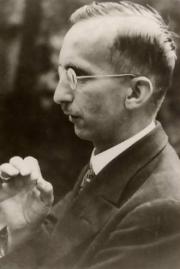Trailer
 Richard Gölz
Richard Gölz
Influential theologian and church musician Richard Gölz (1887-1975) re-introduced music into the pulpit-centered German Protestant Church. Inspired by the Youth Movement, he championed congregational singing, a conscious music-text relation, and active participation in voice, spirit, and intellect. His famous Chorgesangbuch (1934) is a pioneering scholarly edition of 16th-century music. The book reached every protestant church choir in Southern Germany and beyond, and it transformed the repertoire. Still a standard work today, it is known as “der Gölz.” Many chorales Gölz rediscovered are now classics.
In 1933, Gölz initiated a revival of Gregorian chant, working with 10th-century sources before anybody else. Tireless teacher, visionary scholar and editor, passionate promoter of the power of music, Gölz became known as “The Cantor of Swabia.”
Gölz was in the zenith of his career when Hitler came to power. Gölz openly opposed the new regime. Characteristically, he spoke through music: in a scene that has become legendary, he interrupted a “German Christian” sermon by playing the chorale “Oh God, look down from Heaven and have mercy!” on the organ. After this scandal, Gölz was made a simple pastor in the village of Wankheim.
After his move to Wankheim, Gölz, refused the oath to Hitler. A father of five, amid income cuts and reprisals, he mentored and financially supported younger oppositional colleagues. He hid fugitive Jews in his home. In 1944, Gölz was arrested and imprisoned in the concentration camp in Welzheim.
After the war, he distanced himself from the Protestant Church. Interested in Slavic liturgy, and already fluent in five languages, he learned Old Church Slavonic. In 1950, he was ordained as a Russian Orthodox priest. Eight years later, aged 71, he moved with a congregation of Serbian Displaced Persons to Milwaukee. There, he served at St. Sava Serbian Orthodox Cathedral until his death in 1975. Today he is remembered in Yad Vashem.
